Today, again, I am going back in history to an unforgettable day in the calendar of Nigerian football. I don’t know the exact dates, but the two matches took place between October and November of 1977.
As a mark of how important those dates and matches were, some 3 years ago, I was invited by Mr. Benson Ejindu, a patron of Rangers International Football Club, based in Atlanta, Georgia, as a special guest to an event in the United States organized by patrons, supporters and ex-players of Rangers International FC. It was the 40th anniversary of the club’s victory over Shooting Stars in the semi-finals of the 1977 Africa Cup winners Cup, as well as the team’s eventual victory in the finals against Canon Douala Of Cameroon. I was invited to come and tell the 400-plus audience my personal experience of the period and the matches.
Those two matches between Rangers International FC of Enugu and Shooting Stars International FC of Ibadan, are, probably, the two biggest international football matches between two domestic football clubs in the history of Nigerian football.
The tension, the history of competitions between the teams, the reputation of the players in both teams, the heavy tribal sentiments, even the circumstances of Nigerian football at the time, weeks away from the Green Eagles’ most crucial match against Tunisia, the last hurdle to cross in Nigeria’s qualification quest for the World Cup for the first time, all made for a nail-biting encounter that took it to unprecedented heights of anticipation, tension, suspense, drama and excitement.
The rivalry between Rangers and Shooting Stars had started in 1971 when the Ibadan club, founded in Western Nigeria in the early 1960s, dimmed the light of a one-year old Rangers FC that was ‘born’ immediately after the Nigerian Civil war in 1970 and immediately stormed the Nigerian national football scene on a mission that transcended football.
In 1971, Rangers got to the finals of the country’s most prestigious domestic championship, the Challenge Cup, and were only halted by a last-minute penalty kick that Amusa Adisa, in goal for the Shootings Stars, saved off the kick of penalty-kick-specialist, captain of the Green Eagles as well as Rangers FC, Godwin Achebe. The drama of that FA Cup match was talked about for many years and formed the background of a rivalry between the clubs that still sustains, unbelievably, till this day, 49 years after.
Following that loss, Rangers went back to the drawing board and, in 1974, bounced back with an unstoppable ferocity and vengeance, and started a domination of Nigerian football that lasted for seasons. Rangers won almost everything domestic in the years 1974 to 1976 and were the undisputed leader in Nigerian football. Shooting Stars punctuated that monopoly with their own higher continental success in 1976. It became a battle of egos.
By 1977, the setting was perfect for a match that would almost drag the Igbo and the Yoruba into a tribal ‘war’ in Lagos where the two-legs of the matches were to be played. According to the rules of the competition at the time, except for some serious reasons that must be approved by CAF, the semi-finals and finals of the African club matches must take place in the capital city of the countries involved.
Also Read: The Greatest Central Defender In 60 Years Of Nigerian Football
Interestingly, also, both clubs had 10 of their most important players in camp in the national team preparing for the World Cup final qualifying match against Tunisia. There were 5 players from each club of the two clubs, and 4 each were regular players in an emerging Green Eagles exploding with exceptional talent and superstar players.
There were: Emmanuel Okala of Rangers International was considered by many as the best in Africa at the time and freshly decorated as the first Nigerian African Player of the year by the African Sports Journalists Union, ASJU, in Lome, Togo, in 1975; ‘Chairman’ Christian Chukwu, captain of Rangers International (and the Green Eagles) had been leading Rangers to many battles across the continent in the quest to win the African Club championship with each club getting a dose of the bruising physical and mental intimidating style of Rangers forged by one of the bloodiest civil wars in human history – the Biafran War; Adekunle Awesu, the mesmerizing winger with the deadly left footin Shooting Stars was Africa’s best left winger from the Dire Dawa 1976 African Cup of Nation;. Mudashiru Lawal, the leader of a generation of a new breed of midfield ‘generals’ was Nigeria’s most valuable player in Dire Dawa. There was also a football player that ‘exploded’ onto the African football scene as an undergraduate student in 1976, contributed 7 of the 15 goals that won the African Cup winners Cup that year, and on the eve of the 1977 encounter was announced as Third Best Player in Africa – Segun Odegbami.
So, the whole country was super-charged. Lagos was to host the two matches. That first match was an exciting experience for everyone. For two days before the match the stadium complex environment became a theatre of rivals trying to outdo each other in sing and dance and intimidation. On the eve of the match there was a noticeable stream into the city of buses from the East and the West of Nigeria. On match day the stadium and its environs were filled to the brim with energetic fans. Around Surulere in Lagos, it was verbal ‘warfare’ without bullets. The tension was high and we could feel it even in the Green Eagles camp located at the National Institute of Sports inside the National Stadium Complex.
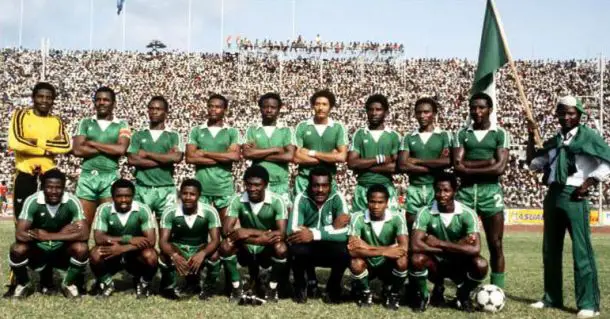
The match ended in a goalless draw, creating bigger tension for the second leg as both teams retired to their corners to prepare their forces better. The tension in Lagos was at breaking point. The match became the conversation all over the country. It was even discussed at the meeting of the Supreme Military Council, the highest organ of government at the time, where the decision to shift the second leg match to Kaduna, a neutral ground, far from Lagos, was taken.
Ahmadu Bello Stadium witnessed the largest audience at a football match in the history of the stadium. Spectators came from all over the country and most hotels in Kaduna were fully occupied.
The match ended again in a goalless draw after regulation time and had to be settled by penalty kicks. Rangers eventually won. They went on to win their final matches against Canon Douala of Cameroon and became the second Nigerian club to win the African trophy.
In all of what went on during that period what was unknown to all Nigerians was the impact the match had on the players from the two teams that were in the national camp preparing for the most important match in Nigeria’s entire history up till that point.
The players, in Lagos and Kaduna, had left their shared rooms in the national camp, went to war against each other on the football fields with one group emerging winners and the other losers. Both groups had to return to the same rooms again after the match in their common national camp to prepare for a bigger battle against an external new ‘enemy’.
How all of that affected the psyche of the players would have been an excellent subject of research and study by scholars of psychology. How did the players shift their psyche, alliances and focus? How did they relate to each other after the grueling wars? How did the battles impact their relationship and life afterwards? How did the matches affect the national assignments? So many questions needed scientific analysis and answers.
Meanwhile, inside the national camp, unknown to those watching from outside and even unappreciated by the players inside, was the level of camaraderie between the players carved by years of staying together, of sharing rooms, eating together, training together, planning victories for the country together, making sacrifices together in sun or in rain, sharing some of their best youthful moments together, winning and losing together, sharing the pain and the sweetness of defeats and victories. They were a ‘nation’ in camp without consideration for tribe or tongue or creed, brought together by football in a spirit of friendship, patriotism and team work.
What became clear to me as an active actor in those two encounters was the bond beyond the rivalry created after the biggest football match in our lives. We went back to camp and all hostilities evaporated on the dining tables and shared rooms, over wisecracks and jokes.
Instead, sport triumphed as an ultimate friendship material.
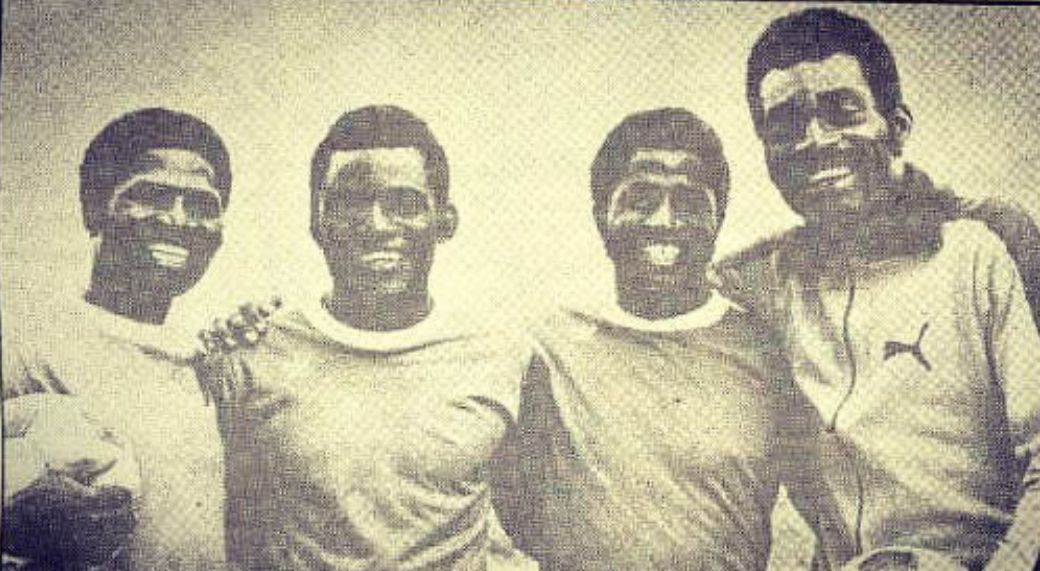
On the eve of the first leg of that 1977 encounter, renowned Daily Times newspaper photographer, Mr. Peter Obe, visited the national camp at the NIS hostels in Lagos. He invited 4 of us for a chat – Christian Chukwu (Captain of Rangers) Emmanuel Okala, Samuel Ojebode (Captain of Shooting Stars) and I. He told us his mission. We listened and learned. He led us out to the roof of the NIS building, the flyover bridge and high-rise buildings on Western Avenue in the distance as the background, and organized a photoshoot.
The following morning, on the day of the first leg match in Lagos, a picture was on the front page of the largest circulating newspaper in Africa and the most powerful newspaper in Nigeria. It was the picture of four players supposedly going to ‘war’ that afternoon, a war that had been brewing dangerously on the streets of Lagos, a war that was building hostile tension amongst tribal groups in the country.
The picture had the four combatants standing shoulder to shoulder the broadest laughter on their faces speaking louder than whatever a thousand words could have done.
The message was simple, ‘this is a game, not war’.
My friendship with Christian Chukwu and Emmanuel Okala has sustained till this day, 43 years after, and getting stronger.
Got what it Takes?
Predict and Win Millions Now






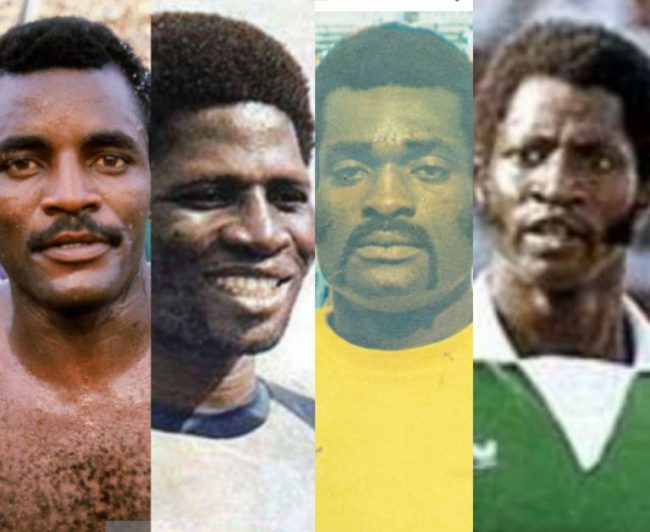
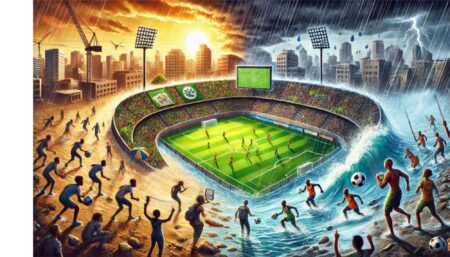
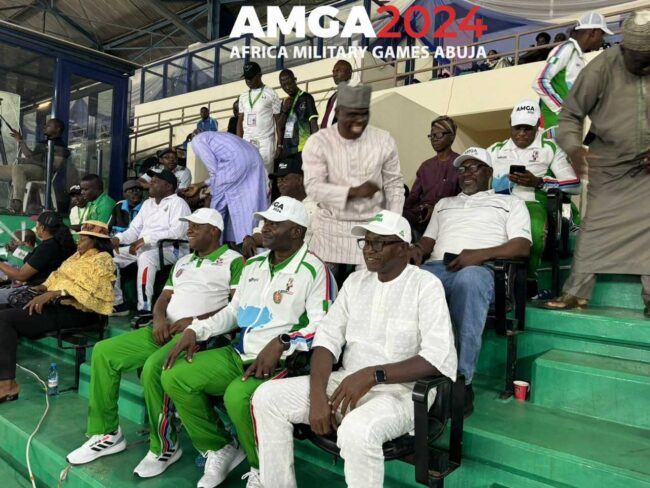
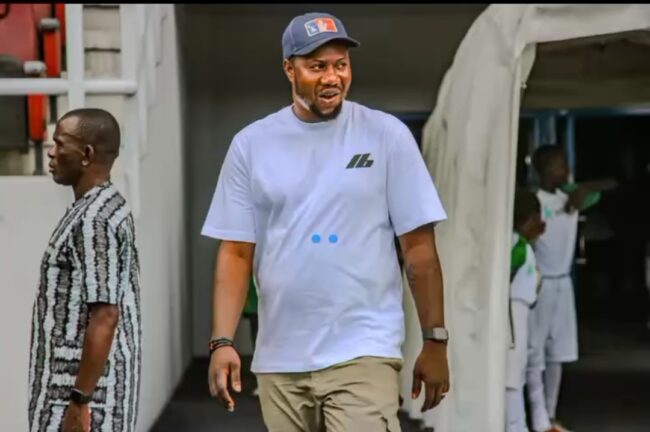



3 Comments
If not for Okalla, that day in Kaduna, Rangers would have wept all the way back to Enugu
So then who finally wept after the match? Moreover that was the reason he was made the goal keeper.
This is a game not war. The relationship continue after the match.
Interesting Story